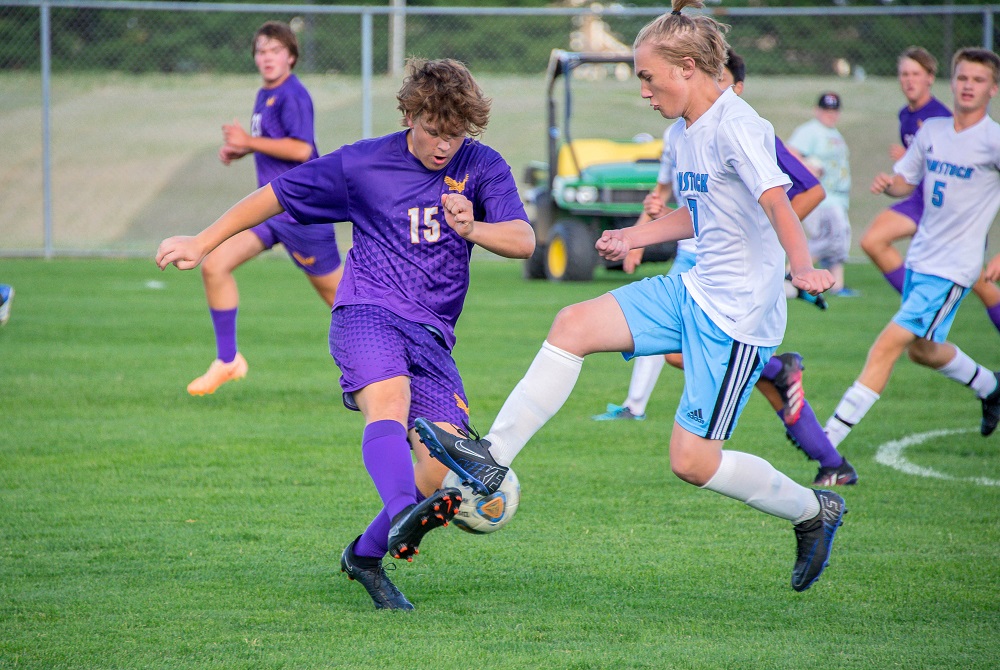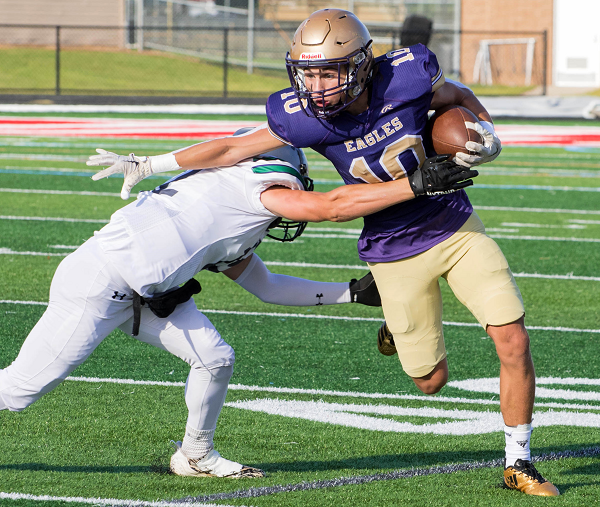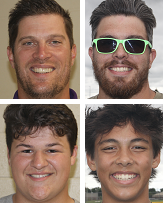
'22 Game' Lasts 2 Plays, Lives on
By
Ron Pesch
MHSAA historian
October 26, 2015
What would you do with 22 seconds to right a wrong?
In Michigan, the longest football game in high school sports history was played on September 23, 1977 when Detroit Southeastern defeated Detroit Northeastern 42-36 in nine overtimes.
But what is the shortest?
On the evening of Thursday, Nov. 5, 1953, Eaton County foes Bellevue and Vermontville squared off in a Tri-C Conference battle. It was a home contest for Vermontville, but without illumination at its field, the game was staged just west beneath the lights at Nashville High School in Barry County.
The dominant team in Tri-C play over the previous three years, Bellevue’s Broncos had posted three consecutive undefeated seasons from 1950 and 1952. However, graduation took its toll and with only five returning veterans in the fall of 1953, Bellevue lost its nonconference season opener to Homer. The Broncos had also dropped a pair of league contests, to Lake Odessa and Olivet, just prior to the Vermontville game, and entered with a 4-3 record.
Vermontville brought a 4-2 mark into the contest, and was in a four-way tie with Bellevue, Nashville and Lake Odessa for second in the conference.
The Broncos and Wildcats were evenly matched and played to a scoreless tie in the first half. Vermontville opened up a 6-0 lead on a 20-yard end sweep by the Wildcats’ quarterback Pete Benton in the third quarter, but entered the final minutes of the game trailing 12-6 thanks to a TD run by Bellevue’s Jim Smith and an early-fourth quarter scoring pass from Smith to Bob Babbitt.
Coach Dave McDowell’s Wildcats mounted a long final drive, and fans strapped in for a thrilling finish. Pushing deep into Bellevue territory, Vermontville faced a fourth down and eight from the 16-yard line with under a minute to play when Benton launched a desperation pass to the end zone.
The pass fell incomplete, but Bellevue was flagged for pass interference. Officials stepped off the penalty and awarded Vermontville the ball at the one-yard line, but the Wildcats’ plunge into the line fell an inch short on what was called a repeated fourth down play. Vermontville took possession and ran out the clock.
Following the game, Coach McDowell protested the ruling to officials, correctly stating that his team should have been awarded an automatic first down and goal from the 1-yard-line on the penalty, according to high school rules. Appealing the call, the situation was brought to the attention of the league, MHSAA executive director Charles Forsythe and the MHSAA athletic board.
On Wednesday, Nov. 11, the state athletic board agreed an error had been made, but did not order a replay. Instead, they noted three possible solutions:
- Result left as it was.
- Called a no contest.
- Replay it at the point of infraction.
The board moved a final decision back to the league. Because of the possible impact on the final conference standings, and eventually, the awarding of the league’s all-sports trophy, the Tri-C Conference opted to replay the contest from the point of infraction – the 1-yard line – with 22 seconds placed on the clock.
 The news of the league’s decision was blasted out by the news services nationwide, and immediately, the pending replay of a small town contest captured the imagination of reporters and sports fans across the United States.
The news of the league’s decision was blasted out by the news services nationwide, and immediately, the pending replay of a small town contest captured the imagination of reporters and sports fans across the United States.
“Shortest ‘Game’ in History?” read the headline in the Lexington, Kentucky Herald. From Biloxi, Mississippi, to Boston, Massachusetts, from Rockford, Illinois to Omaha, Nebraska and Seattle Washington, sports aficionados read the news about the error. Best of all, details flowed forth on the plan to replay critical seconds that might alter the result, fulfilling every fan’s dream.
So began the longest huddle in history.
“What would you do?” was the question on the lips of coaches and followers in barber shops and factories. Detroit Free Press writer George Puscas asked that very question to some of Michigan’s top coaches.
Detroit Lions coach Buddy Parker offered his advice to Vermontville’s coach McDowell.
“The other team will be expecting a run,” noted Parker, “so I would fake a run off tackle then throw a pass in the other direction – with three receivers downfield.”
Michigan State’s legendary Biggie Munn stated the obvious:
“Call a scoring play.”
University of Michigan head coach Bennie Oosterbaan was tied up preparing for the Wolverines’ upcoming contest with MSU, so instead U-M end coach Bill Orwig weighed in with a tongue-in-cheek recommendation:
“Take the time out.”
Earl “Dutch” Clark, in charge at the University of Detroit, suggested that McDowell diagram “two of the most unusual offensive formations … anything to confuse the defense. The first play should be a running play and if it didn’t work, take time out then try again.”
Wayne University’s coach Lou Zarza was the most specific of them all.
“On a goal line stand, the defense usually drifts toward the middle. So I would fake the ball to the right halfback on a slant, then send the fullback with the ball wide to the right, outflanking the defense. It’s a good goal line play on the T formation.”
Suggestions came from all over. A gentleman in Syracuse, New York, even penned a personal letter to McDowell with a sure-fire suggestion.
Three days after the 1953 prep season had officially ended, on the afternoon of Monday, Nov. 16, the same officiating crew and the Vermontville and Bellevue squads emerged and again travelled to Nashville to line up for what can arguably be called the shortest – or perhaps the longest – game in high school football history.
Reporters from Detroit, Grand Rapids, Lansing and Battle Creek converged on the city for 22 seconds of football. High school reporting legends Hal Schram of the Detroit Free Press, Bob Hoerner of the Lansing State Journal, George Maskin of the Detroit Times, Harry Stapler of the Detroit News and writers from the Associated Press and United Press International all descended upon mid-Michigan, “almost as if the Rose Bowl was to be played.”
“That game brought more publicity to coach Gordon Korstange’s 6-3 squad then his teams received for posting three consecutive unbeaten seasons in 1950, 1951 and 1952,” recalled 80-year old Burton H. Brooks, who was the only reporter who had covered the original contest, and one of many covering the replay. A graduate of Bellevue, he was a freshman at Michigan State at the time, earning money as a sports stringer for the Bellevue Gazette and Charlotte Republican Tribune.
Beneath sunny skies, “a crowd of over 500 fans and curiosity seekers, most of them attired in shirt sleeves, lined the field on both sides near the east end of the Nashville gridiron,” wrote Brooks, many years later. “At 5:00 the shrill blast of an official’s whistle split the air, announcing time for the game.”
Attendance was way up from the original contest, and in an unusual move for the time, Kalamazoo television station WKZO announced that they would send a crew to Nashville and then televise the game – (all 22 seconds of it!) – Tuesday evening. In addition, 10 newspaper photographers were on site to capture images from the game.
While the size of the crowd was up, turnout on the football squads had decreased. Vermontville dressed its full squad of 24 for the showdown, but kept out two regular tackles and his first-string quarterback, as all had been on the injured list at the end of the first clash.
Meanwhile, Bellevue brought only 14 players.
“Just our defensive unit and enough to run back the kickoff,” Korstange told the Lansing State Journal, prepared for a situation that could arise if Vermontville scored.
“Three of the defensive starters had decided to go deer hunting instead,” said Brooks discussing the shortened game, “so Bellevue needed to call up some kids for the game from the junior varsity squad.”
“Bellevue won its sixth game of the year, downing Vermontville in a sensational goal line stand in the famous ‘22’ Game” at Nashville last Monday,” wrote Brooks in the Bellevue Gazette. “Coach Dave McDowell’s Wildcats ran two plays against Bellevue, but couldn’t dent the solid Bronco defense. On the first play the Wildcats sent big Bob Steward up center, but he was driven back a yard by the entire center of the Bellevue line.”
 Following a timeout, the Green and White tried to sneak quarterback Pete Benton across the line to the left of center as the ball carrier on the second play, but the hole was quickly plugged by tackle Donald Rogers and guard Jerry Babbitt. Steward had been stopped by Bellevue guard Wayne Lesser. Dale Spotts, Bob Babbitt, Harold Messenger, Ralph Hales, Dick Moon, Jim Smith, Gordon Smith, and Ed Bessemer filled the other defensive spots and ensured the result of the first game went unchanged.
Following a timeout, the Green and White tried to sneak quarterback Pete Benton across the line to the left of center as the ball carrier on the second play, but the hole was quickly plugged by tackle Donald Rogers and guard Jerry Babbitt. Steward had been stopped by Bellevue guard Wayne Lesser. Dale Spotts, Bob Babbitt, Harold Messenger, Ralph Hales, Dick Moon, Jim Smith, Gordon Smith, and Ed Bessemer filled the other defensive spots and ensured the result of the first game went unchanged.
Once again, the wire services blasted their report from sea to shining sea.
“Officials Didn’t Rob Vermontville Team” screamed the headline in the Miami Daily News. Beneath an AP photo, residents of the Florida town were treated to a detailed account of the contest.
“Prep Grid Game Ends Same Way Following 11-Day Break” read the caption in the Dallas Morning News in football-crazed Texas.
“Replayed Grid Game Ends with the Same Result as Before,” read the headline in the Seattle, Washington, Daily Times.
As noted at the time, it certainly wasn’t the first, nor would it be the last, that a refereeing crew made a mistake in a game. Fans then, like now, were reminded officials are only human.
Bellevue ended the extended season in a tie for second with Lake Odessa, with 5-2 marks. For the first time in league history the Tri-C gridiron championship was awarded to Olivet, which, at 8-0, posted its first unbeaten season and, as it turned out, unseated Bellevue for the league’s 1953-54 all-sports trophy.
More than 60 years later, a forgotten showdown between high school football teams, played out before national attention in little Nashville, Michigan, still stands as one of the most entertaining and unusual sports moments in the history of America.
 Ron Pesch has taken an active role in researching the history of MHSAA events since 1985 and began writing for MHSAA Finals programs in 1986, adding additional features and "flashbacks" in 1992. He inherited the title of MHSAA historian from the late Dick Kishpaugh following the 1993-94 school year, and resides in Muskegon. Contact him at [email protected] with ideas for historical articles.
Ron Pesch has taken an active role in researching the history of MHSAA events since 1985 and began writing for MHSAA Finals programs in 1986, adding additional features and "flashbacks" in 1992. He inherited the title of MHSAA historian from the late Dick Kishpaugh following the 1993-94 school year, and resides in Muskegon. Contact him at [email protected] with ideas for historical articles.
PHOTOS: (Top and below) What's believed to be a Battle Creek Enquirer photo shows one of the goal line stands by the Bellevue defense against Vermontville. (Middle) The Lansing State Journal reported on the nationwide reporting of the "22-second game."

Working Together, with Neighbor's Help, Schoolcraft Teams Making Selves at 'Home'
By
Pam Shebest
Special for MHSAA.com
September 19, 2023
SCHOOLCRAFT — If it is a home game for the Schoolcraft football team, head over to Vicksburg.
 If it is soccer, go to Schoolcraft’s baseball field.
If it is soccer, go to Schoolcraft’s baseball field.
Things are a bit jumbled in the sports world for the Eagles this season.
With a new football field under construction and a new elementary school built on the site of the former practice fields, the two teams have been a bit displaced.
“Along with our football field, we had three practice fields that were utilized by a lot of our youth programs, Rocket football, youth soccer and our soccer and football programs,” Schoolcraft athletic director Bryan Applin said. “It’s taken a lot of understanding and flexibility from our coaches, players and our community to make it work out, and it has.”
Meanwhile, all four Eagles home football games will be played at Vicksburg High School.
If Vicksburg is home on a Friday, then the Eagles will play Saturday, including their Homecoming game this Saturday against Galesburg-Augusta.
The Eagles won their only “home” game so far, 33-14 against Kalamazoo United, and take a 3-1 record into Saturday’s contest.
The soccer team gave up its field to the football team for practices and has been practicing and playing their matches in the outfield of the baseball stadium.
For the soccer team, “It’s kind of an upgrade,” Applin said. “The soccer field they traditionally play on, they don’t have a scoreboard, they don’t have a bathroom facility, so we’ve been able to use the (baseball) scoreboard, the PA system, open up the bathroom building.
 “The goal at some point is to give soccer a home, and we’re very, very excited about that.”
“The goal at some point is to give soccer a home, and we’re very, very excited about that.”
This year definitely has been challenging for the first-year AD, who credits Vicksburg athletic director Mike Roy with being a tremendous help.
“Mike Roy has been nothing but accommodating to us,” Applin said. “He’s been super helpful to me stepping in and assuming this scenario.
“The communities are so close, it almost feels like home for us.”
Roy said Jeff Clark, former Schoolcraft AD, reached out once the bond was passed for the new stadium last year.
“We had to make small accommodations as did Schoolcraft to make the schedules work,” Roy said. “By moving (Schoolcraft’s) games to Saturday, Vicksburg had to work with our Rocket football organization to make sure games were completed” before the Eagles varsity games.
Schoolcraft football coach Nathan Ferency said his team has been “rolling with the punches.
“These guys don’t care where it’s at; they just want to play football. We’re all taking care of each other. What a great place to be when everybody works together.”
When Jake Bailey heard the team would be playing at Vicksburg, “That got me excited,” the junior offensive tackle said. “They’ve got a really nice facility. I know the school will come out to support us no matter where we are, but it’s definitely different.
“Good thing we don’t play Vicksburg, although it would be fun because it would be both our home fields. The new facilities and being back at our home field at Roy Davis (Field next year) will be really fun.”
Vicksburg is Division 4, while Schoolcraft is Division 7.
 The soccer team was “just being a team player” in giving up its own field for football practice, second-year head coach Jeremy Mutchler said.
The soccer team was “just being a team player” in giving up its own field for football practice, second-year head coach Jeremy Mutchler said.
“For the soccer team to be a team player and get behind the football team will help the community get behind the soccer team as well,” he added.
The biggest drawback is that part of the current field includes a piece of the baseball infield.
“The only odd thing is it is a smaller field, still regulation size, but smaller,” Mutchler said. “Part of the field is in the diamond, so we have to play in the dirt and it gets tricky, especially when you’re trying to throw it in or just play down the line.”
The move has cost the team a few home games.
“At the beginning of the year, we allowed schools, if they didn’t want to play here, we would go to their house,” Mutchler said. “We had to go to a few schools we would have played at home.”
Maintenance supervisor Eric McGehee was instrumental in preparing the field.
“He laid out exactly the parameters, so I was able to send that to all the ADs that were going to visit to give them an opportunity to decide whether that’s something they wanted to help us out for our home games,” Applin said. “A lot of schools were more than willing to come and play us to give our boys some home games. A couple wanted to be cautious and play on a more traditional surface, and we were able to make those arrangements as well.”
In only its second year as a varsity sport, the boys soccer team is still finding its identity, posting a 2-5 record so far.
 “We’re a very young team,” Mutchler said. “All juniors and freshmen. This is the juniors' second regular season. It’s all been a learning phase with maturity and sportsmanship.”
“We’re a very young team,” Mutchler said. “All juniors and freshmen. This is the juniors' second regular season. It’s all been a learning phase with maturity and sportsmanship.”
Junior captain Jack Curtis said he was a bit “bummed out” when he heard the team would move to the baseball field.
“The first practice, I drove over to our practice field,” he said. “No one was there.
“I drove over to the high school and saw everyone practicing (at the baseball field). I didn’t think a soccer field could fit on a baseball field.”
Curtis said in spite of the temporary move, “I’m just glad we can have some home games this year on Schoolcraft soil.”
As for Applin, he spent much of his career coaching basketball at both the high school and college levels and most recently worked as a salesman for Zeigler. His wife, Meredith, is an assistant coach for Western Michigan University’s women’s basketball team.
Ferency is appreciative of the work Clark and Applin have done to make this season’s changes relatively seamless.
“I’d like to highlight how great our athletic department is,” he said. “It takes a lot of moving pieces and parts to move people around and have a space for everybody.
“I’m really proud of our athletic department and all our coaches and kids for just rolling with the punches.”
 Pam Shebest served as a sportswriter at the Kalamazoo Gazette from 1985-2009 after 11 years part-time with the Gazette while teaching French and English at White Pigeon High School. She can be reached at [email protected] with story ideas for Calhoun, Kalamazoo and Van Buren counties.
Pam Shebest served as a sportswriter at the Kalamazoo Gazette from 1985-2009 after 11 years part-time with the Gazette while teaching French and English at White Pigeon High School. She can be reached at [email protected] with story ideas for Calhoun, Kalamazoo and Van Buren counties.
PHOTOS (Top) Schoolcraft’s varsity boys soccer team, including Nyan Wonders (15), faces Comstock this season on its field in the outfield of the baseball stadium. (2) Schoolcraft’s Kolby Lloyd (10) works to break away from a tackler during a “home” game played at Vicksburg this fall. (3) Clockwise, from top left: Schoolcraft football coach Nathan Ferency, Schoolcraft boys soccer coach Jeremy Mutchler, soccer player Jack Curtis and football player Jake Bailey. (4) Schoolcraft athletic director Bryan Applin has taken over the maneuvering of the teams’ home sites during his first year on the job. (Action photos by Stephanie Blentlinger/Lingering Memories Photography. Headshots and Applin photo by Pam Shebest.)

